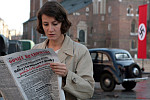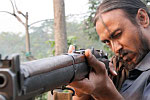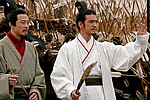 Shadows off the beaten path
Shadows off the beaten pathMID-AUGUST LUNCH | RED CLIFF
< < F O R E I G N > >
last update 9.Jun.09
See also: SHADOWS FILM FESTIVAL
 R E V I E W B Y R I C H C L I N E
R E V I E W B Y R I C H C L I N E
scr Przemyslaw Nowakowski, Wladyslaw Pasikowski, Andrzej Wajda
with Artur Zmijewski, Maja Ostaszewska, Maja Komorowska, Wladyslaw Kowalski, Jan Englert, Danuta Stenka, Andrzej Chyra, Pawel Malaszynski, Magdalena Cielecka, Agnieszka Glinska, Agnieszka Kawiorska, Antoni Pawlicki

release Pol 21.Sep.07,
US Apr.08 tff,
UK 10.Apr.09
07/Poland 1h58
BERLIN FILM FEST
 Impeccably shot and edited, this harrowing drama digs into the mystery of the murder of some 12,000 Polish officers in the early 1940s, which the Soviets falsely blamed on the Nazis. It's extremely grim, but well worth seeing.
Impeccably shot and edited, this harrowing drama digs into the mystery of the murder of some 12,000 Polish officers in the early 1940s, which the Soviets falsely blamed on the Nazis. It's extremely grim, but well worth seeing.
Despite her pleas, Anna (Ostaszewska) is unable to convince her husband Andrzej (Zmijewski) to abandon his post in the Polish army when the Soviets invade their country's German-held territory. Arrested with his friend Jerzy (Chyra), he's taken into Russia and cut off from his family, who has no idea where he is. Soon Anna hears about a horrible massacre at Katyn, but Andrzej isn't among the dead. Years pass before the truth emerges.
Indeed, the Soviets never admitted what happened, and it wasn't until after the fall of the USSR that the real story came out. Master filmmaker Wajda captures his nation's outrage through the intensely personal perspective of the characters. It's the kind of thing that could have gone badly wrong, but Wajda knows exactly how much information to give us along the way, letting us experience the events as if we were living them.
The production design is first-rate, with slick and beautiful cinematography (by Pawel Edelman) and a remarkably grounded sense of the period. Wajda also manages to keep things fairly clinical, like a documentary that refuses to take sides and merely presents the facts. Even though it's not always easy to follow the rapidly passing years, the through-story is powerfully involving, and beautifully played by both Ostaszewska and Zmijewski. And since we have such a strong human connection, the inhumanity of the events is that much more devastating.
In many ways, the entire film feels like a requiem. There are strong Catholic overtones (including the recurring metaphor of a rosary), and the film provocatively taps into a sense of national guilt as well. But it's the unspeakable horror of the events themselves that lingers after the film ends, as innocent people are murdered in cold blood and the concept of truth is profoundly perverted. Yes, it's very heavy, but it's also an extremely important story. And Wajda tells it with honesty and artistry.
16.Jan.09
 R E V I E W B Y R I C H C L I N E
R E V I E W B Y R I C H C L I N E
scr Sadik Ahmed, Heather Taylor
with Tariq Anam Khan, Ahmed Rubel, Tanveer Hassan, Anisur Rahman Milon, Tanju Miah, Jayanto Chattopadhyay
 release UK 26.Jun.09
release UK 26.Jun.0908/Bangladesh 1h21

 With a Shakespearean sense of tragic momentum, this dark Bengali drama creates a lush atmosphere that feels almost oppressive. But its slow pacing and elusive plotting keep us at arm's length.
With a Shakespearean sense of tragic momentum, this dark Bengali drama creates a lush atmosphere that feels almost oppressive. But its slow pacing and elusive plotting keep us at arm's length.
In an isolated corner of Bangladesh, Thakur (Khan) is the only Hindu. He's building a temple, which makes him the focus of everyone's suspicion and anger, most notably the Chairman (Rubel), a Muslim who seems to run everything. Then an armed ex-soldier (Hassan) arrives in town and shakes things up. While searching for clues about his parentage, he's willing to work for pay. Thakur hires him as a bodyguard, but the Chairman also pays him as part of his goal to get rid of Thakur once and for all.
Throughout the film, there's a past event that's alluded to ominously, and we realise quickly that this is what connects all three of these men. But the story is told, intriguingly, through the eyes of a young boy (Miah) who serves tea to the Chairman and watches with naive curiosity as these people plot against each other. As he wonders who is the hero and villain of this blurry story, the themes come quietly to life in an almost poetic way that catches us off guard.
On the other hand, the storytelling is almost painfully slow, while there's a general murkiness underlying all of the characters and situations. Even the religious tension at the centre of the story feels impenetrable, despite some provocative commentary: "An armed man who doesn't believe in God is dangerous," says the Chairman about the soldier. There's an almost overpowering feeling that violence and tragedy are just around the corner. And so is the truth.
This is a story about power and legacy, and it's packed with telling details, such as the way the Chairman's two wives rule his life. The whole story takes place in one day and builds inexorably to a conflict that has been stoked with false accusations, sneaky attacks and underhanded manipulation, all of which make it impossible to know who the good guy is. Self-interest infuses each character and, with his cold narrative style, director-cowriter Ahmed foreshadows the only way the story can end. And it's a rather hard pill to swallow.
17.Apr.09
 R E V I E W B Y R I C H C L I N E
R E V I E W B Y R I C H C L I N E Pranzo di Ferragosto
Pranzo di Ferragosto
with Gianni Di Gregorio, Valeria De Franciscis, Marina Cacciotti, Maria Calì, Grazia Cesarini Sforza, Alfonso Santagata, Luigi Marchetti, Marcello Ottolenghi, Petre Rosu, Biagio Ursitti
 release It 5.Sep.08,
release It 5.Sep.08, US Apr.09 sf, UK 14.Aug.09
08/Italy 1h15
VENICE FILM FEST



 This warm Italian comedy takes a look at generational issues without getting preachy about it. Filmmaker-actor Di Gregorio's almost fly-on-the-wall style continually catches us off guard with its humour and insight.
This warm Italian comedy takes a look at generational issues without getting preachy about it. Filmmaker-actor Di Gregorio's almost fly-on-the-wall style continually catches us off guard with its humour and insight.
The middle-aged Gianni (Di Gregorio) lives with his mother Valeria (De Franciscis). It's August, when Romans abandon the city for their holidays, and since Gianni is behind on his condo fees, he agrees to care for the mother and aunt (Cacciotti and Cali) of the building manager (Santagata), who wants to take a holiday with his girlfriend. Then Gianni's doctor (Ottolenghi) drops off his mother (Sforza) as well. But can Gianni survive in his flat with four lively, feisty old women telling him what to do?
Since Gianni is unemployed, everyone assumes that he doesn't need a holiday. He manages to grab time to himself here and there, but most of his life is spent tending to his mother, and now these others as well. So it's intriguing to see Gianni rise to the challenge, which allows the film to gently explore how society deals with its older members. There's no sermonising here, but it's clear that Gianni's approach enriches both his life and these four women.
Everything about the film is understated, from the acting to the cinematography, which takes a documentary approach to each scene. Everything looks utterly normal, and the film is packed with real-life touches and throwaway moments. The dialog alone is a minefield of offhanded comedy, as characters drop witty details into the mix, from Valeria's mistrust of anyone new to the doctor's strict guidelines for his mother's diet. All of this is played in a way that draws out smiles of recognition and outright laughter.
There realty isn't a story, although the seemingly banal events seem to be building to either a confrontation or a moment of insight. Indeed, it's all leading to the eponymous lunch, the Ferragosto celebrated on August 15th to mark the middle of summer. More important is the fact that this is also the Holy Day of Obligation, which is clearly the point De Gregorio is making. And of course the ultimate revelation is that caring for the older generation an obligation at all.
8.Jun.09
 R E V I E W B Y R I C H C L I N E
R E V I E W B Y R I C H C L I N E MUST
MUST  SEE
SEE
scr John Woo, Chan Khan, Kuo Cheng, Sheng Heyu
with Tony Leung, Takeshi Kaneshiro, Zhang Fengyi, Chang Chen, Zhao Wei, Hu Jun, Shido Nakamura, Chiling Lin, You Yong, Hou Yong, Tong Dawei, Song Jia

release Chn 10.Jul.08,
UK 12.Jun.09
08/China 2h30
THREE KINGDOMS
 John Woo applies his whizzing, sweeping visual style to Chinese history, making this film one of the most hugely entertaining battle epics in recent memory. Utterly riveting, we barely feel two and a half hours pass.
John Woo applies his whizzing, sweeping visual style to Chinese history, making this film one of the most hugely entertaining battle epics in recent memory. Utterly riveting, we barely feel two and a half hours pass.
In AD 208, China is divided into warring states as Prime Minister Cao Cao (Zhang) ruthlessly consolidates power by conquering as many kingdoms as possible. His main target is the western empire of Liu (You), who sends his ace advisor Zhuge (Kaneshiro) to unite with the southern emperor Sun (Chang). As they square off against Cao Cao's advancing forces along the Yangtze near Red Cliff, Zhuge creates a fragile alliance with Sun's viceroy Zhou (Leung). Vastly outnumbered, Zhuge and Zhou must rely on strategy and wit if they hope to survive.
This is the most famous battle in Chinese history, documented in the epic 14th century novel Romance of the Three Kingdoms. But Woo isn't concerned with reverence or historical accuracy; he's making an exhilarating movie that soars through massive military encounters, brainy action scenes, and sexy heroes and heroines. This is history as visceral cinema: we identify with characters and feel the violence of each blood-soaked battle, while clever strategies and complex ambushes add depth to the swooping aerial cinematography and huge-scale effects.
It also helps that the characters are so vividly drawn, with strong performances that find subtle layers amid the on-screen pyrotechnics. Leung and Kaneshiro are terrific heroes, with dark shadings and a wonderfully awkward chemistry. They are superbly contrasted against Zhang's swaggering Cao Cao. And there are some involving female characters as well, including Wei as an inventive princess warrior and Lin as Zhou's tenacious wife, who's also the object of Cao Cao's affection and brews a mean pot of tea.
Woo stages every battlefield encounter with clarity and urgency, and each set piece is thrillingly complex, from the astounding turtle formation to a grisly variation on biological warfare. Even when he's building character connections (including a dodgy sex scene), Woo hyperactively keeps the film surging forward. The result is literally breathtaking, as well as visually staggering and deeply satisfying. And beneath all that, it's a terrific story about an underdog standing up for principles against all odds.
16.Apr.09


See also: SHADOWS FILM FESTIVAL
© 2009 by Rich Cline, Shadows
on the Wall